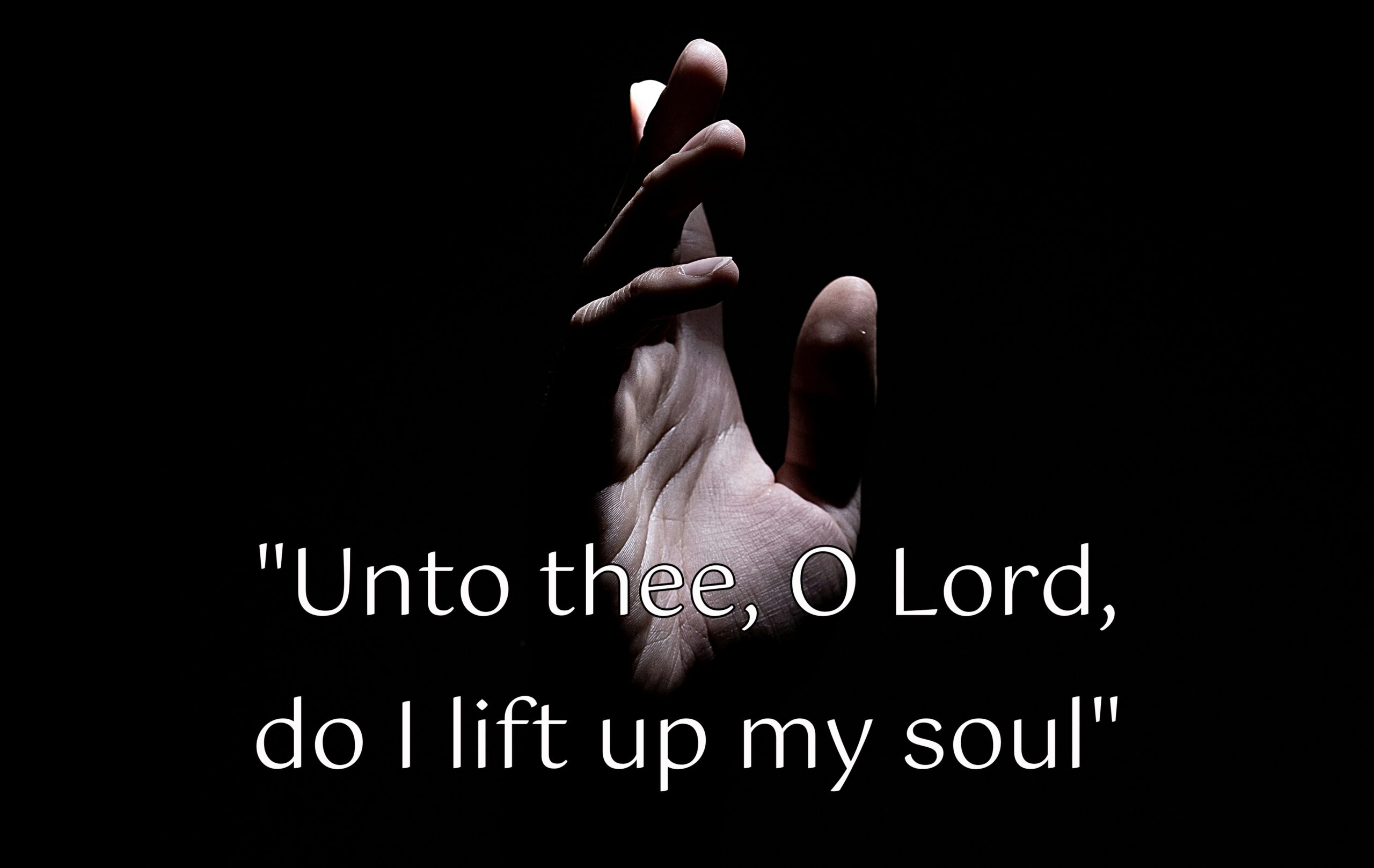PSALM 25 – Introduction – Part Two
Psalm 25 – INTRODUCTION
Part Two
AN ACROSTIC PSALM
(*SEE NOTE #1 below)
Not only is Psalm 25 one of the seven Penitential Psalms it is also one of the nine Acrostic Psalms (Psalm 9, 10, 25, 34, 37, 111, 112, 119 and 145). In the Ancient Hebrew language an Acrostic writing (*see note #2 below) is one in which the arrangement of the text is structured and constrained according to the Acrostic Law: each verse (or group of verses as in Psalm 119) begins with consecutive letters of the Hebrew Alphabet. Acrostic writings are a structured design according to the intent of the author. It is a type of writing that requires forethought and planning; an expression undertaken with deliberation and intent. As with all of God’s expressions we find in this a revelation of God’s character and being.
His Word is never hastily spoken or expressed without the full intent of His thought and heart. God, being who He is, is bound by the wonder of His Glory and Character. It is this unassailable truth that causes all who love Him to worship and praise Him. He is never rash or given to sudden outbursts for He is governed by the constraint of His Own Character. Righteousness, in part, is growing into His likeness concerning this aspect of God.
As we grow in this righteousness rage, lust, temptation and other impulses of behavior are now ruled by the wisdom of His Life within our hearts. There is the constraint of the Spirit to bring forth a tempered and measured response to the circumstances we face. An Acrostic inspired writing follows a law of expression to give us insight into this particular facet of God’s Glory.
In this Psalm, though each verse (by pre-design) begins with a consecutive letter of the Hebrew alphabet, the theme flows with a central subject even while it is constricted to a severe style of writing. So is it to be in our own lives; the central purpose of revealing Him is governed by the law of His Life within us. Our growth into Him is to become more like Him in the common flow of everyday life. Growth is revealed in the desire to communicate His words and thoughts into the lives around us. The fear of the
Lord causes us to measure our words because we know the things we speak will be weighed in the balances of His Righteousness. As the Proverb declares “the tongue of the wise is health”. Those who love God, and know of this discipline and grace, are always in the grip of being “instant in season and out of season”. The difference between a flood and a river is that the river is channeled and flows within the banks of God’s appointed purpose.
“My heart is inditing a good matter:
I speak of the things which I have made touching the king:
my tongue is the pen of a ready writer”
Psalm 45:1
One does not have to read many of the Psalms to know some of the expressions spring from great moments of spontaneous praise while others give expression to deep discouragement and penitence. Here however we find the “constrained” and well thought out theme. As mentioned earlier this is a Psalm of a seasoned Elder, a man of considerable experience with His God, and it reveals the thoughts and state of David’s heart.
God is not rash in dealing with His Own. There is a deliberate and steadied response to our iniquities and sins. There is a fragrance we discover in this Psalm of a Covenant Keeping God; a God who keeps and reveals His purposes and covenant with those who “fear Him” (verse 14). He does not alter His call upon anyone who seeks Him with a pure and right heart. Though great and many are the faltering steps of His Own…He is the Covenant Keeper.
How precious are His ways and His thoughts towards us! It is in our dark times of great trial and perplexity that we can call to mind this character of our God who holds us in the firm and steady grip of His own being. Those who are His have this assurance within their own hearts, not on some doctrinal level, but as a living truth that brings security when we are broken and have faltered in our way. If we hold such things as a mere doctrine, we will never know of the sorrow or brokenness of heart that accompanies our transgressions.
“For Your name’s sake, O Jehovah,
even pardon my iniquity for it is great”
Psalm 25:11
It is in seeing Him who is constrained by His own love and purposes that we begin to see in part the power of this truth being developed in our own lives. Things which would have brought unrestrained expressions of anger and bitterness in the past become less and less as we grow in the grace and knowledge of our Lord and Savior. Wisdom and peace become the arbitrators of our heart as we progress in our walk with Him.
“And wisdom and knowledge
shall be the stability of thy times…”
Isaiah 33:6
It is in this stability and knowledge of God’s keeping power that we settle into the Arms of our Everlasting Father.
“Surely I have behaved and quieted myself,
as a child that is weaned of his mother:
my soul is even as a weaned child.
Let Israel hope in the LORD
from henceforth and for ever”
Psalm 131:2-3
Psalm 25 Series: Psalm 25 –
Psalm 25 – Introduction – Part One
Psalm 25 – Introduction – Part Three
Psalm 25 – Part Four – Trust
Psalm 25 – Aleph

NOTES
NOTE #1: Acrostic (etymology) comes from the French word acrostiche derived from the Latin word acrostichis which is from the Greek word ἀκροστιχίς a compound word of ἄκρος meaning highest point or top, and στίχος meaning verse.
NOTE #2: List of Acrostic writings in the Old Testament
1: Psalm 25 Each Hebrew consonant covers 1 verse.
2: Psalm 34 Each Hebrew consonant covers 1 verse.
3: Psalm 37 Each Hebrew consonant covers 2 verses.
4: Psalm 111 Each Hebrew consonant covers ½ verse.
5: Psalm 112 Each Hebrew consonant covers ½ verse.
6: Psalm 119 Each Hebrew consonant covers 8 verses.
7: Psalm 145 Each Hebrew consonant covers 1 verse.
8: Lam 1- 4 In chapter 1 and 2 each Hebrew consonant covers 1 verse which consists of 3 stanzas. In chapter 3 each consonant covers 3 stanzas/verses, therefore it has 66 verses.
Chapter 4 has 22 verses, each consonant consists of 2 stanzas beginning with that letter of the alphabet.
Chapter 5 has 22 verses, but is not an alphabetic acrostic.
11: Prov 31: 10 –31 Each Hebrew consonant covers 1 verse.
12: Nahum 1: 1- 9 The Aleph covers three lines. There seems to be an interjection of 2 lines before the rest of the consonants, which covers only one verse each. The letter zayin appears in the second position of the line.

“In the common form of acrostic found in Old Testament Poetry, each line or stanza begins with a letter of the Hebrew alphabet in order. This literary form may have been intended as an aid to memory, but more likely it was a poetic way of saying that a total coverage of the subject was being offered — as we would say, ‘from A to Z.’ Acrostics occur in Psalms 111 and 112, where each letter begins a line; in Psalms 25, 34, and 145, where each letter begins a half-verse; in Psalm 37, Proverbs 31:10-31, and Lamentations 1, 2, and 4, where each letter begins a whole verse; and in Lamentations 3, where each letter begins three verses. Psalm 119 is the most elaborate demonstration of the acrostic method where, in each section of eight verses, the same opening letter is used, and the twenty-two sections of the psalm move through the Hebrew alphabet, letter after letter”. –J.A. Motyer, “Acrostic,” in The New International Dictionary of the Bible (Grand Rapids: Zondervan, 1987), p. 12.
Brian Troxel




Brian – I appreciate the Spirt guided and enabled effort you’ve put into bringing us His Truth and Life.
Hello Reg,
Thank you for the encouragement, hope to be up your way next month.
Blessings
Brian